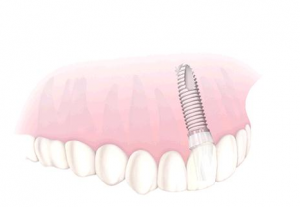Using the most recent advances in dental implant technology, Dr. Greco is able to place single stage implants. These implants do not require a second procedure to uncover them although they do require a minimum of 6 weeks of healing time before artificial teeth are placed. There are even situations where the implants can be placed directly after a tooth extraction, which further minimizes the number of surgical procedures. Advances in dental implant technology have made it possible, in select cases, to extract teeth and place implants with crowns during one visit. This procedure, called “immediate loading,” greatly simplifies the surgical process.
Implants are a team effort between an Oral and Maxillofacial Surgeon and a Restorative Dentist. While Dr. Greco performs the actual implant surgery and (if necessary) the initial tooth extraction(s) and bone grafting, the restorative dentist (your dentist) fits and makes the permanent prosthesis. Your dentist will also make any temporary prosthesis needed during the implant process.
A single prosthesis (crown) is used to replace one missing tooth. Each prosthetic tooth attaches to its own implant. A partial prosthesis (fixed bridge) can replace two or more teeth and may require only two or three implants. A complete dental prosthesis (fixed bridge) replaces all the teeth in your upper or lower jaw. The number of implants varies depending upon which type of complete prosthesis (removable or fixed) is recommended. A removable prosthesis (over denture) attaches to a bar or ball in socket attachments. A fixed prosthesis is permanent and removable only by the dentist.
Dr. Greco performs in-office implant surgery in a hospital-style operating suite, thus optimizing the level of sterility. Inpatient hospital implant surgery is for patients who have special medical or anesthetic needs or for those who need extensive bone grafting from the jaw, hip or tibia.
Why dental implants?
When you lose several teeth – whether it’s something you have lived with for years or a new situation or – chances are you have never become fully accustomed to losing such a vital part of yourself. Once you learn about dental implants, you realize there is a way to improve your life. Dental implants offer you an opportunity to rebuild your self-confidence.
A Swedish scientist and orthopedic surgeon, Dr. Per-Ingvar Branemark, developed this concept for oral rehabilitation more than 35 years ago. With his pioneering research, Dr. Branemark opened the door to a lifetime of renewed comfort and self-confidence for millions of individuals facing the frustration and embarrassment of tooth loss.
Why would you select dental implants over more traditional types of restorations?
There are several reasons: removing a denture or a “partial” at night may be inconvenient; if your denture ‘slips,’ it can be uncomfortable and embarrassing; and why sacrifice the structure of surrounding good teeth to bridge a space?
Are you a candidate for implants?
If you are considering implants, you must have a thorough mouth examination and medical and dental history review. If you mouth is not ideal for implants, then other ways of improving outcome, such as bone grafting, may be recommended.
What type of anesthesia is used?
The majority of dental implants and bone grafts can be performed in the office under local anesthesia, with or without general anesthesia.
Warranty
Implants have been so successful in Dr. Greco’s practice that if an implant should fail within a 10-year period, she will remove the implant, allow the area to heal and then replace it, at no cost to you.
This warranty is for the implant only. If the bone needs to be grafted, which is something Dr. Greco has no control over, the grafting procedure will not be covered by this warranty.
If the implant fails, and you chose not to replace it, this warranty is not good, in equal value, towards any other procedure in my office, nor can it be extended to work done on any other family member.
 For most patients, the placement of dental implants involves two surgical procedures. First, implants are placed within your jawbone. For the first 3 to 6 months following surgery, the implants are gradually bonding with the jawbone beneath the surface of the gums. During this time, you should be able to wear temporary dentures and eat a soft diet. At the same time, your dentist is forming new replacement teeth.
For most patients, the placement of dental implants involves two surgical procedures. First, implants are placed within your jawbone. For the first 3 to 6 months following surgery, the implants are gradually bonding with the jawbone beneath the surface of the gums. During this time, you should be able to wear temporary dentures and eat a soft diet. At the same time, your dentist is forming new replacement teeth.
